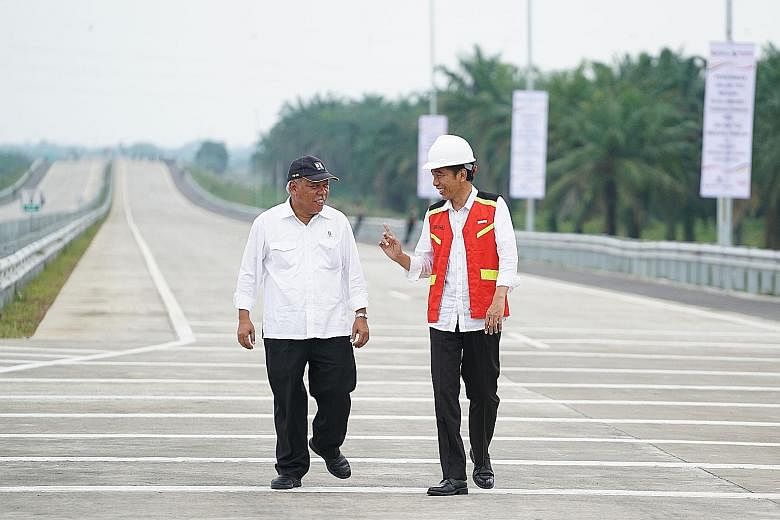Tomorrow marks Indonesian President Joko Widodo's fourth year in office, but the popular leader - who succeeded in pushing for infrastructure development, and reforms in healthcare and education, as well as fighting corruption - refused to be drawn into re-election talk just yet.
Speaking to Bloomberg news in an interview earlier this week, Mr Joko said: "I am now just concentrating on the job, on the tasks the people have entrusted me to do... Regarding the upcoming presidential election, I'll leave it to the people."
The question of re-election comes less than a year before the next election cycle, when key regions like West Java, the largest electorate in Indonesia, head to the polls.
But his reply did not come as a surprise to observers, many of whom said this was a reflection of his humility, as he is one who keeps the people, instead of his own re-election hopes, as his priority.
This explains why his approval ratings have soared, with recent polls putting him comfortably higher than his closest rivals for the next presidential election, due in 2019, when his five-year term ends.
The President has refused to see the results of the popularity polls as a boost, preferring instead to see it as a means for his government to identify areas for improvement.
-
Key achievements
-
Among Mr Joko Widodo's key accomplishments in the first three years:
• Ending fuel subsidies that otherwise would cost about 300 trillion rupiah (S$30.1 billion) a year to make petrol pump prices affordable.
• A tax amnesty programme that added 4,855 trillion rupiah in previously undeclared assets to the state's coffers. The programme has also broadened the country's tax base, providing greater future tax revenue.
• All three major rating companies - Standard & Poor's, Moody's Investors, and Fitch Ratings - raised Indonesia's investment grade for the first time since the Asian financial crisis.
"A survey should provide us with a means of bringing about corrections for what we have and need to change. What we have to do. All have shortcomings, for instance, those in the sectors of law and socio-culture," said Mr Joko, in an interview with Antara news on Monday.
When the former furniture businessman won the elections in 2014, Time magazine put him on its cover with the headline "A New Hope", calling him a force for democracy.
This was mainly because he is the first democratically elected President of the vast archipelagic state who has no ties to the Jakarta political blue bloods or the military elite, who traditionally hold the power.
But the political outsider will need to gear up to fight his rivals from the entrenched interest groups already preparing for the 2019 race, many of whom are marshalling conservative Islamic forces to attack Mr Joko.
His opponents have found it hard to attack his performance on the economic front as he has done well to stabilise growth, and have instead targeted his Muslim credentials.
Mr Joko, 56, was not close to influential Muslim clerics during the last presidential campaign, and had left his then running mate, Mr Jusuf Kalla, a strong Muslim figure, to court Islamic constituents.
The President in recent months has made moves to get closer to Muslim organisations. And he also has been going after groups who hid behind social media to rally against his ally, former Jakarta governor Basuki Tjahaja Purnama, who was defeated in the April polls and is now behind bars for insulting the Quran.
On the economic front, South-east Asia's biggest economy has grown at 5 per cent in the last two years, above most of its regional neighbours, but needs to grow at a faster clip to provide strong job growth for its youthful population.
The plus points in his three-year-old record book show that Mr Joko's accelerated reforms was helped by saving government funds after he eliminated fuel subsidies.
Mr Joko also successfully carried out a tax amnesty programme that brought in US$370 billion (S$500 billion) in previously undeclared assets. And his strong stance against corruption is popular with the public, though he knows he is standing up against entrenched interests.

